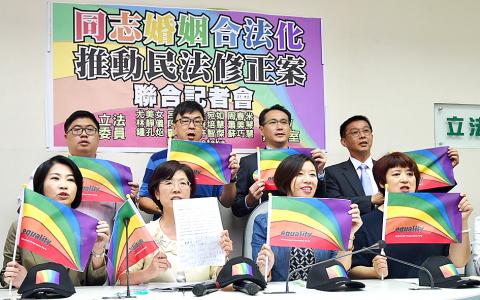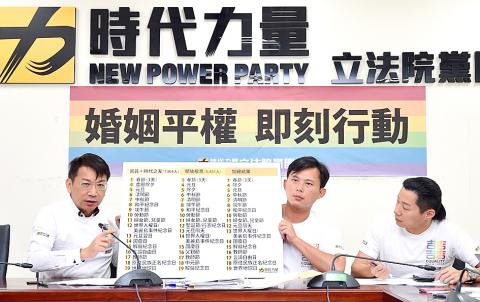Democratic Progressive Party (DPP) lawmakers yesterday pledged to renew a push to amend the Civil Code to legalize same-sex marriage, while the New Power Party (NPP) unveiled similar draft legislation.
“While many local governments accept household registrations from same-sex couples, it is just an executive measure that does not give them full legal rights,” DPP Legislator Yu Mei-nu (尤美女) told a news conference at the legislature in Taipei.
A dozen DPP lawmakers in rainbow caps waved rainbow flags while shouting their support for gay marriage during the news conference.

Photo: Chien Jung-fong, Taipei Times
Yu, who was one of the sponsors of an amendment to revise the Civil Code in the previous legislative session, said a new amendment has been submitted with the support of 40 lawmakers, including Chinese Nationalist Party (KMT) Legislator Jason Hsu (許毓仁).
The proposal would legalize same-sex marriage by changing the law’s definition of the constituents of a marriage from a “man and woman” to “two sides.”
“Many people have been asking why no amendment has been submitted and the reason is that details are important, and we have been putting a lot of thought into what should be covered,” she said. “This time we want an overall rule added: Gays and heterosexuals will have the right to equally enjoy the benefits of marriage, including parental authority over children and freedom from discrimination in adoption cases.”

Photo: Chien Jung-fong, Taipei Times
“There is also a need for a partnership law, but it should apply equally to heterosexuals and gays,” Yu said, referring to a draft bill proposed by the Ministry of Justice.
DPP Legislator Lin Ching-yi (林靜儀), cosponsor of the proposed amendment, avoided the question whether it was supported by President Tsai Ing-wen (蔡英文), calling for the public to pay attention to Tsai’s actions and promises.
The Chinese-language >>>Liberty Times>>> (the >>>Taipei Times>>>’ sister newspaper) said that Tsai would issue a public statement this week on same-sex marriage ahead of the first national gay pride parade during her administration.
The NPP draped its office building with a rainbow banner to show its support for same-sex marriage, as its caucus detailed its proposed amendments.
Amendments to the Family Act (家事事件法) are being proposed as the first step of what NPP Executive Chairman Huang Kuo-chang (黃國昌) said would be an extensive revision of related laws, such as those governing benefits afforded to relatives of government employees.
The proposed DPP and NPP amendments were criticized by the Alliance of Religious Groups for the Love of Families Taiwan, with several protesters demonstrating outside the gates of the Legislative Yuan.
“What gay activists want is for their lifestyle to be affirmed by society, but why do they need to change the traditional institution of marriage, which goes back thousands of years?” alliance secretary-general Chang Shou-yi (張守一) said.
Chang said legalization would encourage young people to experiment with gay life and open the door to polyamory.

A preclearance service to facilitate entry for people traveling to select airports in Japan would be available from Thursday next week to Feb. 25 at Taiwan Taoyuan International Airport, Taoyuan International Airport Corp (TIAC) said on Tuesday. The service was first made available to Taiwanese travelers throughout the winter vacation of 2024 and during the Lunar New Year holiday. In addition to flights to the Japanese cities of Hakodate, Asahikawa, Akita, Sendai, Niigata, Okayama, Takamatsu, Kumamoto and Kagoshima, the service would be available to travelers to Kobe and Oita. The service can be accessed by passengers of 15 flight routes operated by

MORE FALL: An investigation into one of Xi’s key cronies, part of a broader ‘anti-corruption’ drive, indicates that he might have a deep distrust in the military, an expert said China’s latest military purge underscores systemic risks in its shift from collective leadership to sole rule under Chinese President Xi Jinping (習近平), and could disrupt its chain of command and military capabilities, a national security official said yesterday. If decisionmaking within the Chinese Communist Party has become “irrational” under one-man rule, the Taiwan Strait and the regional situation must be approached with extreme caution, given unforeseen risks, they added. The anonymous official made the remarks as China’s Central Military Commission Vice Chairman Zhang Youxia (張又俠) and Joint Staff Department Chief of Staff Liu Zhenli (劉振立) were reportedly being investigated for suspected “serious

ENHANCING EFFICIENCY: The apron can accommodate 16 airplanes overnight at Taoyuan airport while work on the third runway continues, the transport minister said A new temporary overnight parking apron at Taiwan Taoyuan International Airport is to start operating on Friday next week to boost operational efficiency while the third runway is being constructed, the Ministry of Transportation and Communications said yesterday. The apron — one of the crucial projects in the construction of the third runway — can accommodate 16 aircraft overnight at the nation’s largest international airport, Minister of Transportation and Communications Chen Shih-kai (陳世凱) told reporters while inspecting the new facility yesterday morning. Aside from providing the airport operator with greater flexibility in aircraft parking during the third runway construction,

American climber Alex Honnold is to attempt a free climb of Taipei 101 today at 9am, with traffic closures around the skyscraper. To accommodate the climb attempt and filming, the Taipei Department of Transportation said traffic controls would be enforced around the Taipei 101 area. If weather conditions delay the climb, the restrictions would be pushed back to tomorrow. Traffic controls would be in place today from 7am to 11am around the Taipei 101 area, the department said. Songzhi Road would be fully closed in both directions between Songlian Road and Xinyi Road Sec 5, it said, adding that bidirectional traffic controls would